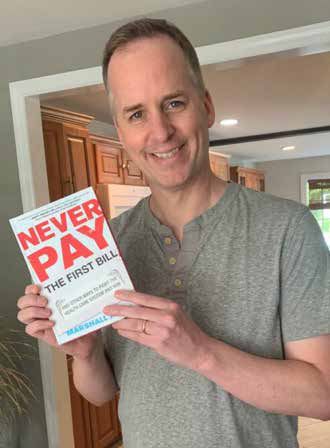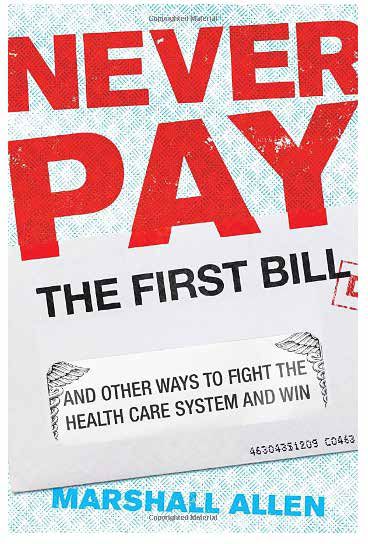“Never Pay the First Bill”
Making the case for professionalism
By Marshall Allen
Review by Phil Calhoun
After reading this book it is clear the author has done an excellent job covering many aspects of the health industry. From a health insurance professional’s perspective, I appreciated how he explains billing situations, how medical bills and codes work, ideas on how to access tests and treatment, and more. The book is an excellent resource for experienced brokers and a solid teaching tool for those newer to health insurance especially when it comes to client service work. I am of the belief that all health insurance professionals act on a morale code to be the best advocate for clients as possible. This book aligns with this concept and seeks to empower individuals to be informed consumers and be equipped to fight for what is right.
The examples in the book demonstrate a well-rounded view of the issues that can develop when seeking medical care and comes with suggestions on managing these situations. This is all very valuable for health insurance professionals who seek to be a helpful client advocate. When training staff who are learning the benefit business, I have found myself repeating many of the points the author makes. This suggests that most experienced health insurance professionals often do the same for their staff. This book can be both a handy reference and a valuable teaching tool for most agencies.
I draw attention to the valuable tips covered at the end of each chapter where in the “Take Action” sections, readers will get a helpful summary of the chapter key points and tips to use now.
Some examples to help advocate for clients include:
a) Pg 33 www.healthcarebluebook.com and www.fairhealthconsumer.org which list price fairness ratings.
b) Pg 34 www.clinicpricecheck.com to find hospital price checks.
c) To work with a patient advocate go to www.advoconnection.com and nahac.com to find more about what an advocate does.
d) Pg 42 is on appeals and how they can work when applied to gain access to tests and treatments which have not been approved and for ways to go out of network to get the medical care necessary.
e) Pg 56 lists the three keys to a successful appeal and p. 58-59 provides readers a summary of a proven appeal process.
f) Pg 130 covers drug discounts and tips on saving hundreds by using discount programs with lists of several sites to visit.
g) Chapter 9 covers health broker issues
Comment: Much of the focus is on what is defined in California as large not small group benefits. We know small group benefits are fixed by the ACA with no significant design flexibility. While the section on self-funding seems accurate, many of the problems linked to annual premium changes, commissions, coverage and rate dynamics apply only to large groups. Considerable content is focused on avoiding a bad behaving broker, one who is motivated only by commissions and bonuses.
h) Appendix C has 13 questions an employer can ask their broker about their ethics.
The author ventured into concepts about “bad brokers” and addresses some situations many would consider to be outlier cases concerning very bad actors in the industry.
As far as covering compensation, in California compensation disclosure is mandatory and is focused on fees some brokers are still able to charge for services rendered. Much energy was placed on financial incentives carriers offer to sell their products and bonuses paid by carriers for selling their plans. In California, the Department of Insurance limits carrier and broker compensation and incentives may be situational. Marketing support is often restricted to basic lead generation materials and tips. Occasionally a stay incentive from a carrier in small group is offered as well as an incentive to write business. If there is no incentive offered to remain competitive, one must ask how that will work in a capital market driven system.
Finally, many of concerns are addressed in both the legislation preventing the aggressive incentives to write small group business in California and by the fact that the best medical plan products are sold more due to consumer demand.
While making money is one of the reasons health insurance professionals are in the business, it is clear all professionals are paid for the work they do. For brokers and agents, the goal is to help their clients find the right coverage within their budget and in doing so they become the professional trusted advisor. This makes incentives, while nice to receive, not the focus, because the goal is client satisfaction. A satisfied client stays with their trusted advisor longer and refers business to them as well.
For local health insurance professionals, integrity and service have always been top priorities. General agencies and carriers can be helpful partners as the support they bring is required for brokers to completely address their client’s needs.
Health brokers can also learn from the author’s explanation of the industry’s pressure points and how companies and individuals have fought overbilling, price gouging, insurance denials and more to get the care they deserve. Understanding the practical tips to protect against the system’s predatory practices which the author offers can provide inspiration to use these “tried-and-true” strategies.

Marshall Allen is a reporter for ProPublica, where he covers the health care industry. He is a Pulitzer Prize finalist and recipient of Harvard Kennedy School’s Goldsmith Prize for Investigative Reporting. He teaches investigative reporting at the Newmark Graduate School of Journalism at the City University of New York and has spoken at various conferences across the country. Prior to journalism, he spent five years in full-time ministry, including three years in Kenya.
Contact: www.marshallallen.com
Benefits of professional organizations – power in numbers
To more effectively address the often-negative label health insurance professionals get from far too many, consider joining your local chapter, state and national professional associations and learn how the small investment in membership has a huge value.
Over my many years in this business, I have seen how newcomers benefit when becoming a member of a professional association as they witness how the power of numbers makes a difference.
At events you can mix with friendly colleagues and discover the many ways the association boosts your professionalism. In addition, you will see how the role of the health broker is positioned professionally in the industry — and have the opportunity to educate politicians each year whom in turn play a role in representing voters. With knowledge conveyed by our professional organization representatives, legislators can impact the problems within the medical industry with a greater understanding of the health insurance professional’s role.
Membership with associations such as NABIP and CAHIP are an excellent way to learn and be involved in the industry. With the experience of professional membership comes the opportunity to join the local professional chapter and network with colleagues at the many educational events. Industry involvement enhances your ability to grow your business and reinforce your advocacy role with clients. We “sell ourselves” to our clients and then we “sell” our role in the industry. Through joining we find colleagues who all share the belief in the vital advocacy role we play in the health industry.
When you join National Association of Benefits and Insurance Professionals you also become a member of your local chapter in California at www.cahu.org

Phil Calhoun is owner and publisher of California Broker Magazine. Phil also is a leader in coaching health insurance professionals. He is an active member of several insurance associations including the California Association of Health Insurance Professionals (CAHIP) and local chapters in Orange County, Los Angeles, San Diego and Inland Empire Health Insurance Professionals. He attends many state and local California chapter meetings.
Phil’s book, “The Health Broker’s Guide: To Protect Grow and Sell Commissions” is available free at www.healthbrokersguide.com.
He offers complementary 15-minute coaching sessions. To schedule a phone call “Click Here”
Contact:
phil@commission.solutions
714-664-0311

